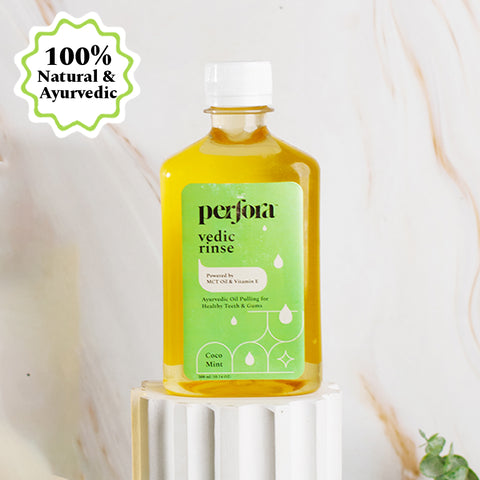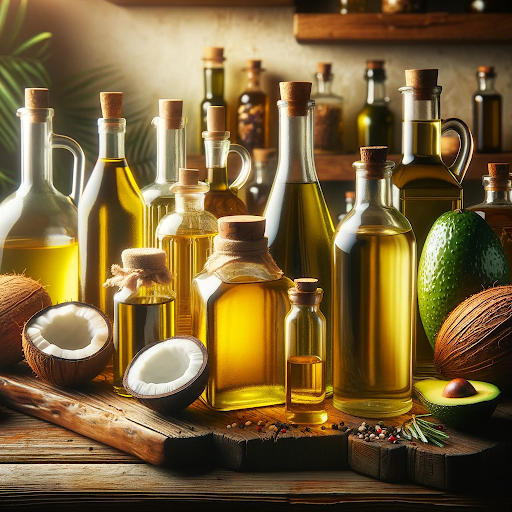In the ever-evolving world of dental care, traditional practices often merge with modern science to create holistic approaches that not only promise a bright smile but also ensure overall oral health. One such ancient technique that has gained tremendous popularity in recent years is oil pulling. At Perfora, we are firm believers in integrating best practices into daily routines, and so, we introduce you to the art of oil pulling. Our specially formulated Perfora Vedic Rinse Oil Pulling - Coco Mint, is a testament to our commitment to offering you safer and more effective alternatives for maintaining oral hygiene.
Key Takeaways
- Oil pulling is an ancient Ayurvedic practice that offers numerous benefits for oral health, including reducing plaque, combating bacteria, and promoting healthier gums and fresher breath.
- When choosing an oil for oil pulling, look for qualities such as antimicrobial properties, a favourable chemical composition high in lauric acid, pleasant flavour and texture, and purity from organic sources.
- Specific oils like coconut, sesame, sunflower, neem, and mustard offer unique benefits for oil pulling, such as antimicrobial properties, anti-inflammatory effects, and support for gum health.
- To effectively practise oil pulling, ensure to do it consistently, choose the right time (preferably in the morning on an empty stomach), swish gently for 15-20 minutes, and follow up with proper disposal of oil, rinsing, and brushing with an SLS-free toothpaste for comprehensive oral health care.
The Basics of Oil Pulling
Oil pulling is a traditional Ayurvedic method that involves swishing oil in the mouth for a period, typically 15-20 minutes, to improve oral health. The practice is believed to draw out toxins from the body, reduce plaque, and combat bacteria in the mouth. This simple yet effective technique has been handed down through generations and is celebrated for its myriad benefits, including whiter teeth, healthier gums, and fresher breath.
Criteria for Choosing the Best Oil for Oil Pulling
When delving into oil pulling, the choice of oil is paramount. The best oil for oil pulling should have antibacterial properties, be palatable, and have a pleasant texture for easy swishing. Here are the qualities to look for:
- Antimicrobial Properties: The oil should be capable of reducing harmful bacteria in the mouth.
- Chemical Composition: High levels of lauric acid are preferred for their ability to combat bacteria and viruses.
- Flavour and Texture: Since the oil will be in your mouth for a while, choose one with a pleasant taste and a comfortable texture.
- Purity and Organic Origin: Organic, cold-pressed oils are ideal as they retain most of their natural properties and are free from harmful chemicals.

Which oils are best for oil pulling?
Several oils stand out for their effectiveness in oil pulling, each offering unique benefits:
- Coconut Oil: Often cited as the best oil for pulling, coconut oil is rich in lauric acid, known for its antimicrobial properties. It's effective against bacteria that cause tooth decay and gum disease.
- Sesame Oil: Traditional Ayurvedic practice favours sesame oil for its ability to reduce plaque and detoxify the oral cavity. It's considered a good oil for oil pulling due to its anti-inflammatory and antibacterial properties.
- Sunflower Oil: With its mild flavour, sunflower oil is another popular choice. It's high in Vitamin E, an antioxidant that supports gum health.
- Neem Oil: Neem oil for oil pulling is a strong candidate. Its extensive use in Ayurvedic medicine for its antibacterial and anti-inflammatory qualities makes it an excellent choice for oral health.
- Mustard Oil: Mustard oil pulling for teeth is known for its warming properties and ability to improve circulation in the gums, providing a unique approach to oral health maintenance.

How to Use Oil Pulling Effectively
Incorporate oil pulling into your daily dental care with a few key steps for maximum benefits. Start in the morning on an empty stomach to enhance toxin elimination. Use approximately one tablespoon of your preferred oil, swishing gently in your mouth for 15-20 minutes to allow it to mix with saliva and draw out impurities. It's important not to ingest the oil as it collects harmful bacteria. Afterward, dispose of the oil in the trash (not the sink to prevent plumbing issues), rinse your mouth with warm water, and brush as usual, preferably with an SLS-free toothpaste. You can refer to the How to do oil pulling blog for a more detailed guide on the topic.
Conclusion
Incorporating oil pulling into your daily oral care regimen can significantly enhance your dental health, offering a natural and effective way to combat bacteria, reduce plaque, and promote gum health. With a variety of oils to choose from, including the recommended coconut, sesame, sunflower, neem, and mustard oils, you can tailor your oil pulling practice to suit your preferences and specific oral health needs.
At Perfora, we are dedicated to providing you with not only the best products for your oral health but also with the knowledge to make informed choices about your dental care routines. Our Perfora Vedic Rinse Oil Pulling - Coco Mint combines the traditional benefits of oil pulling with the refreshing taste of mint, making it an excellent addition to your morning routine. Remember, the key to oil pulling perfection lies in consistency, the right choice of oil, and integrating it with a comprehensive oral hygiene practice.
Embrace the ancient wisdom of oil pulling and step into a world where dental health is nurtured naturally. With the right oil and technique, you're not just cleaning your teeth but also investing in your overall well-being. Let's embark on this journey to optimal dental health together, with nature's best at our side.
Frequently Asked Questions on Best Oils for Oil Pulling
1. Which oil is better for oil pulling: sesame or coconut?
Both sesame and coconut oil are excellent choices for oil pulling, each with its unique benefits. Coconut oil is lauded for its high lauric acid content, making it very effective against bacteria and promoting oral health. Sesame oil, a traditional favourite, is rich in antioxidants and has anti-inflammatory properties. The choice between sesame and coconut oil depends on personal preference and specific health goals.
2. Can I use ghee for oil pulling?
Yes, ghee can be used for oil pulling. Known for its anti-inflammatory properties, ghee is a clarified butter that's been used in Ayurvedic practices for centuries. It's considered beneficial for soothing and healing the oral tissues, making it a suitable alternative for those looking for different oil options.
3. Can I use any oil for pulling?
While many oils can be used for oil pulling, it's best to choose oils with antimicrobial and anti-inflammatory properties for optimal benefits. Oils like coconut, sesame, sunflower, neem, and mustard are most commonly recommended due to their specific health benefits for the mouth and gums. It's important to use high-quality, cold-pressed, organic oils whenever possible to ensure the best results.
4. Best oil for oil pulling for receding gums?
Neem oil is often recommended as the best oil for oil pulling specifically for receding gums due to its potent antibacterial and anti-inflammatory properties. Its ability to fight gum disease and enhance oral health makes it an excellent choice for those looking to address receding gums.






